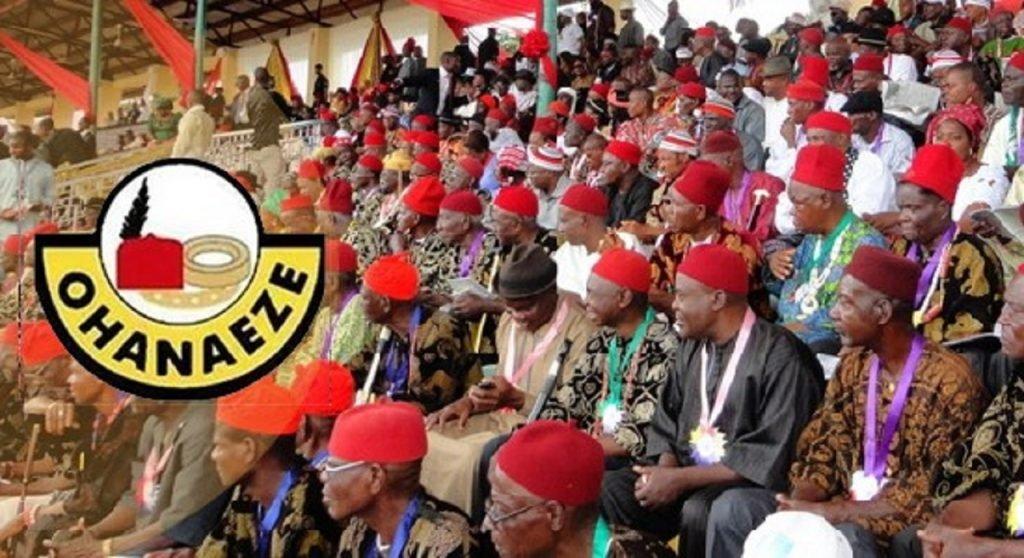Apex Igbo socio-cultural organization, Ohanaeze Ndigbo Youth Council Worldwide, on Sunday, came hard on the Economic and Financial Crimes Commission, EFCC, over its role in the ongoing trial of former Deputy Senate President, Senator Ike Ekweremadu.
The group’s statement signed by its National President, Mazi Okwu Nnabuike was in reaction to the revelation that the EFCC wrote a letter to the United Kingdom court where the lawmaker is standing trial.
Ohanaeze said its earlier position that there is more to the London travail of Ekweremadu than meets the eye had now been justified by the revelation in court on Thursday by the lawmaker’s legal counsel, Chief Adegboyega Awomolo (SAN), that the EFCC authored a letter with which the London Metropolitan Police scuttled the Senator’s bail in the ongoing organ harvest trial and also concealed vital information from the Federal High Court Abuja to obtain an ex-parte interim assets forfeiture order against the lawmaker.
READ ALSO: ‘My Wife Thought I Was Fraudster – Ali Baba
The organisation also expressed outrage over what it described as the EFCC’s decision to ignore petitions against former executive office holders with well known corruption allegations to hunt after Ekweremadu, who as a lawmaker, had not been in a position to administer public funds.
These were contained in a statement issued by the National President of Ohanaeze Ndigbo Youth Council Worldwide, Mazi Okwu Nnabuike, on Sunday.
Ohanaeze Ndigbo Youth said: “The revelation in court that the EFCC indeed armed the London Metropolitan Police with the letter with which it scuttled Chief Ike Ekweremadu’s bail has justified our November 2022 statement that the anti-graft agency was working hand in glove with foreign and local interests to to detain and nail the lawmaker at all cost.
“We disagree with the EFCC that the said letter was a mere routine to a counterpart government agency and that the asset forfeiture proceedings instituted against Ekweremadu only after exchanges of communication with the London Police and while in detention was a mere coincidence.
“Even if no legally stipulated timeframe for the EFCC to initiate forfeiture proceedings or criminal charges against a suspect as claimed by the agency, is it patriotic, professional, ethical, and auspicious for the anti-graft agency to go after a man they claim to have been investigating since 2008 only when he was detained in London?
“Would the London Metropolitan Police arm the EFCC with a letter to sabotage the bail application of a British citizen, let alone Member of Parliament, in a Nigerian court, pledge its readiness to go to court against that citizen in London while in Nigerian detention, and go ahead to do exactly that?
“Is it honourable on the path of the EFCC to have withheld from the Federal High Court the fact that it had investigated Ekweremadu for well over a decade and that the lawmaker is in detention in a foreign land and would not be available to defend himself, knowing that the hoourable court would be guided by such information in making a just decision on whether or not it should indeed grant the interim assets forfeiture which it ordered against the lawmaker which in October?”
It described as a shameful the fact that while developed democracies, including the UK and USA, were known to embark on diplomatic overdrive to secure respite and freedom of their citizens facing drug-related and more heinous charges in foreign lands, the EFCC is injecting itself malevolently into Ekweremadu’s overseas trial in a clearly unrelated matter.
READ ALSO: NDDC: Why Senate Rejected Ondo Nominee – Akinyelure
“From Nuhu Ribadu to Farida Waziri, Ibarahim Lamorde, Ibrahim Magu, and now Abdulrasheed Bawa, the chairmanship of the EFCC has permanently resided in one part of the country since its inception, thereby resulting in a clear pattern of persecution, humiliation, and assets stripping of southern people and businesses by the agency.
“Besides, it is most unfortunate that the EFCC has overlooked its Augean stable most recently relating to the humongous allegations of corruption against its last Chairman as well as other issues of alleged mismanagement of recovered or seized assets but only to hunt after a distinguished Nigerian lawmaker in detention and facing trial in a foreign land,” it concluded.
